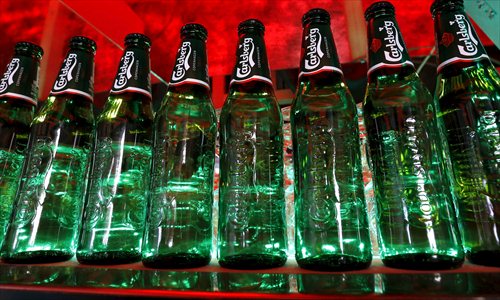HOME >> BUSINESS
Carlsberg Q1 sales hit by decline in Chinese market, currency fluctuation
Source:Reuters Published: 2016-5-11 21:13:01

Bottles of Carlsberg beer are seen in a bar in St Petersburg, Russia. File photo: CFP
Danish brewer Carlsberg A/S on Wednesday said sales fell more than expected in the first quarter due to decline in the Chinese market and foreign exchange fluctuation.
Sales fell 3 percent to 13.01 billion Danish crowns ($1.99 billion), missing the 13.18 billion crowns average of 14 analyst estimates compiled by Thomson Reuters. The negative impact from foreign exchange amounted to 5 percentage points, the brewer said.
Sales in Asia, one of Carlsberg's primary growth regions, fell 0.7 percent to 3.5 billion crowns. Analysts had expected growth of more than 2 percent.
"Beer market development in Asia was mixed with continued growth in markets such as India and Nepal while the Chinese market declined by 3 to 4 percent," Carlsberg said in a statement.
The brewer said sales volume grew in India and Nepal but declined in China as a result of brewery closures.
Carlsberg's sales in Asia surpassed those in Eastern Europe last year but volume fell in China. Carlsberg decided to close seven breweries mainly in eastern China to focus on strongholds in the western part of the country.
Carlsberg is the smallest of the world's four biggest brewers. There will soon be only three, with the planned $100 billion takeover of SABMiller Plc by Anheuser Busch Inbev SA. Heineken NV is ranked third.
China is increasingly important for big international beer brands as growth elsewhere stalls. The country accounted for half of the industry's global volume increase last year.
Snow is China's top-selling beer with a market share of around 30 percent. AB Inbev said in March it would sell 49 percent of Snow to China Resources Beer Holdings Co as part of its planned takeover of SABMiller.
Since assuming his role a year ago, Carlsberg Chief Executive Cees 't Hart has launched a cost-cutting program and a strategy to boost growth, which has been subdued since the takeover of leading Russian beer brand Baltika AS in 2008.
Reuters
Posted in: Companies